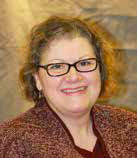By Carolyn Jorgenson, RN, BSN
As a registered nurse for more than 36 years, I understand first-hand how important it is to reduce unnecessary hospital visits and readmissions. Nurses want nothing more than to take care of their patients and send them back to healthy lives in their own homes. If patients need nursing care in their homes, public health nurses are educated and trained to care for their ongoing medical needs.
Minnesota RNs have concerns about a proposal in the Legislature that could have serious impacts on patients who have just returned home from the hospital and need more care.
Senate File 176 would give emergency medical technicians authority to perform some of the care that nurses provide to patients recently released from hospitals.
RNs value and support the important work EMTs perform. They are a critical part of our healthcare system.
However, the bill in the Legislature could put patients in jeopardy.
I have been a hospital RN, a public health nurse, and a women’s health care nurse practitioner. I was required to have a Bachelor’s degree in nursing in order to even be certified as a public health nurse in Minnesota and get a job in that field.
RNs receive at least 1700 hours of learning while earning their degree. Approved courses for EMTs generally require 120 hours.
EMTs and paramedics are very knowledgeable about emergency treatment and emergency medicines. But do they know about medication and treatment for chronic diseases? I took a whole semester’s course in order to learn pharmacology and I continue to learn new medication information daily. (Yes, even after 36-plus years)!
So, if an EMT goes to visit a patient who has recently been discharged from the hospital, and the patient states they are “taking the pink pill but not the blue pill,” an EMT may not know what every drug is used for and how they all relate to that patient’s condition and how the different medications interact.
I realize they say the EMTs will be “providing treatment under the medical director’s license,” but I would never believe an ambulance service medical director would be available 24/7 to do a medication review on every patient!
My concerns stem from my dedication – and all nurses’ dedication – to our patients and to see they get the care they deserve, and for which our great state has earned a reputation as a leader in healthcare. When supporters of the bill say they’re concerned about the rising costs of healthcare, I say, “What is a life worth? What is a person’s health worth?”
If hospitals really want to help our discharged patients, they should send highly trained and educated nurses to patients’ homes for follow-up. This would save millions of dollars by preventing readmissions. I don’t believe this bill as written is going to help our residents.

